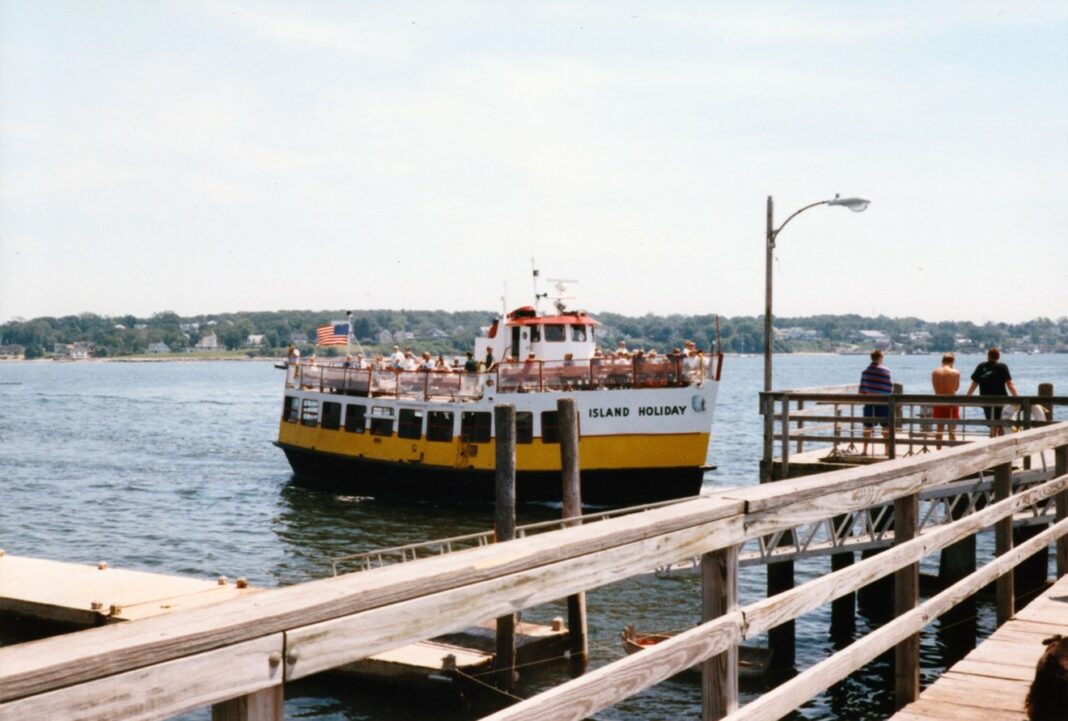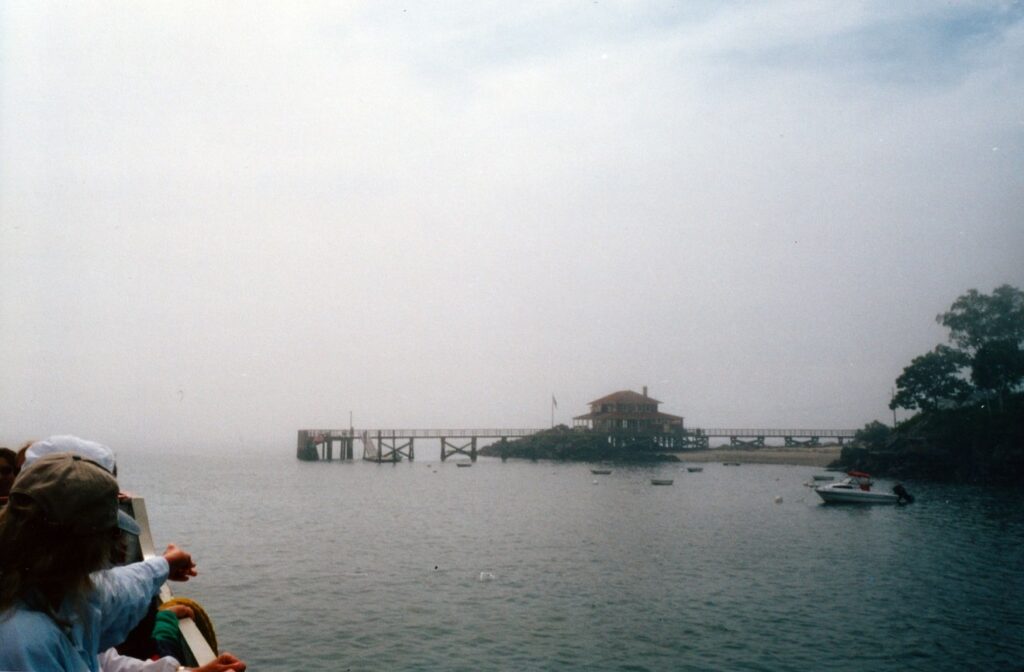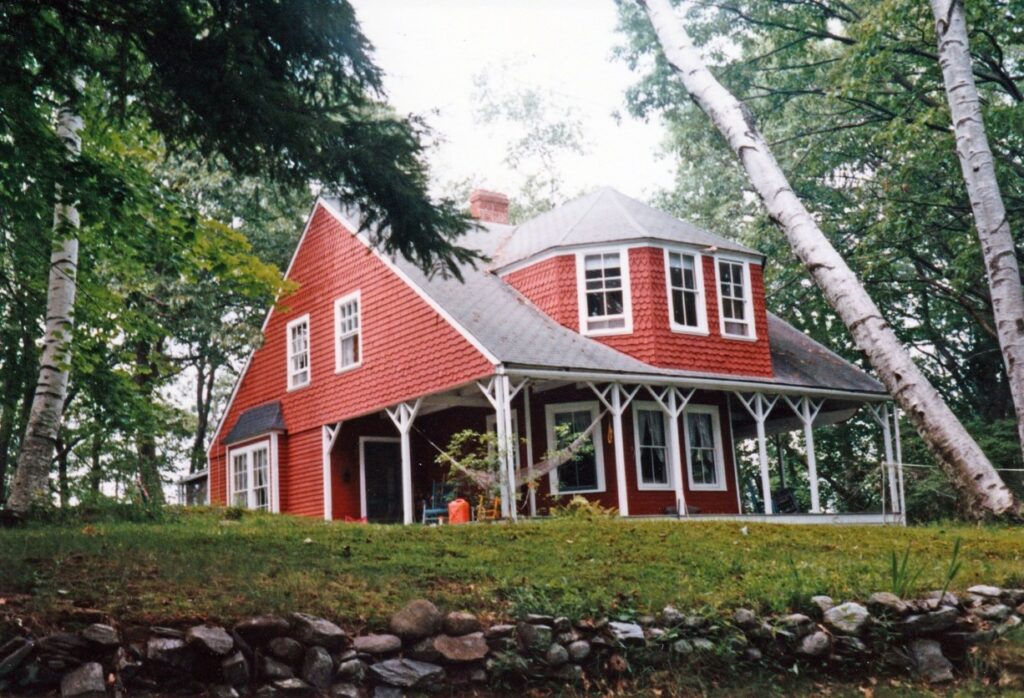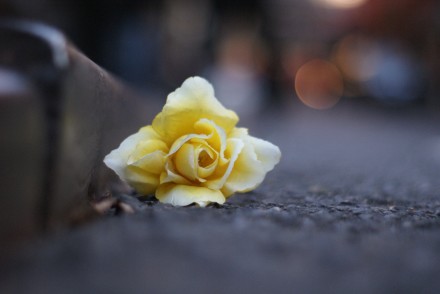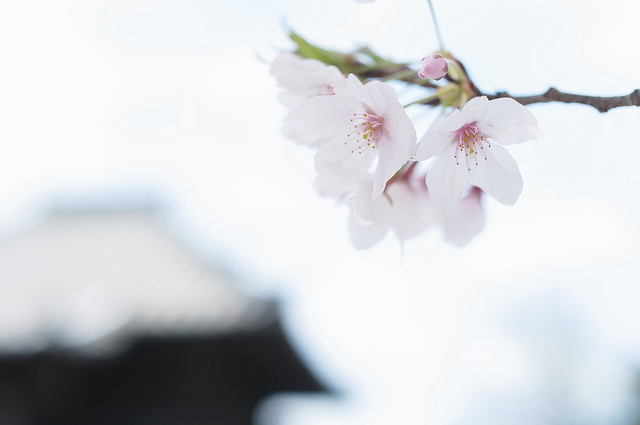Little Diamond Island, Portland, ME. Lamenting the spoliation of the English villages of his youth Evelyn Waugh wrote, “To have been born into a world of beauty, to die amid ugliness, is the common fate of all us exiles.” This beautifully expresses the reason that Little Diamond Island evokes such joy. Ninety years later, to have been born into a world of ugliness and only vacation amid beauty, is the common fate of us exiles. Perhaps this is why some native visionary changed the name of our little island from Little Hog to Little Diamond.
Bounded as it is by the crisp waters of Casco Bay, it is uniquely situated to evoke “a world of beauty” to which the bulk of our generation is utterly unused. Adding to the tragedy is the lamentable fact that few are aware in any distinct way of their deprivation. Raised without a sense of history the world into which one is born seems like the only world there ever was. “Evoked” is precisely the word to communicate the effect which that strange and wonderful little place has on the soul. To evoke is “to call forth or summon.” The idea of such a peculiar spiritual power is largely denied by most modern people. The evocative is not quantifiable or dissectible. It is the experience of the human spirit coming face to face with an atmosphere which is impossible to reduce to a description of trees, flowers and cottages. To qualify all of these elements with the word “quaint” would be nearer to the point. It means: “agreeably curious, unfamiliar or unusual.”
What is agreeably curious about this island is that what is unusual should not be unusual in our human experience. We, who like Waugh do not see scientific progress as a savior, are exiles; and our island is a rare sanctuary from the madness of modern life. It is, in a sense, delightfully impractical. It has none of the frantic efficiency which sterilizes so much of our culture. And for those of us who are committed to live prophetically amid the madness for the rest of the year, as lights in a dark place, our sanctuary proves particularly salubrious.
I am reminded, as I arrive at Little Diamond, of the Old Testament tabernacle, where worshipers entered the innermost glory in stages. Such glory must be approached reverently, and with care not to miss the contrast between the emptiness or lightness of the outer and the weightiness of the inner. Perhaps, also, because the glory is so overwhelming in its power and beauty, or should I say in the power of its beauty, in the effulgence of its manifest excellence, the approach is crucial to one’s appreciation of the innermost place.
From the breakneck speeds and the wearisome sameness of the interstate we enter the more humanly scaled brick architecture of Portland’s Old Port. In common with all American cities, there is an air of aimless activity, combined with an ersatz antiquity, which pays mere lip-service to history, that pollutes the atmosphere. The demonic spirit of Tyre and Carthage, in which trade was a tyrant and excessive luxury was an addiction, pervades. But there remains a hint of a gentler, better time.
Then, parting with our car, we arrive at Casco Bay Ferry Terminal. Embarking on the “Island Holiday” (originally “holy day”), the atmosphere we have come to love begins to surround us. Aboard the ferry, technology is more obviously at the mercy of the elements. One is almost humbled by the strain of the engine against the tide and current and comforted by the ceiling of orange life preservers. The force of the boat pummeling the piers of the island wharf introduces an unpredictable element of adventure, usually manicured from all forms of modern travel. Solitude and sanctuary are achieved only with some difficulty.
The walk down the gangplank is a ritual, a rite of passage, in which not civilization, but the lack of it, is happily set adrift as the ferry pulls away, leaving us in its tumultuous wake. It is not civilization, as the Club Med ad wrongly has it, for which we need an antidote, but the new barbarism, which cares little for what it cannot count, spoil, or kill.
The long walk down the dock brings the entire island into perspective. It a great porch to the temple which Little Diamond is. No sanctuary should be without an ascent. So we begin our uphill trek. One does not escape our troubled world without in some way rising above it. Burdened with weeks of food and clothing, the anxiety of all people, we realize the agony involved in divorcing oneself from this wicked world.
Only one thin human width of ground is smothered with bituminous concrete. At the top of the hill it ends. The only vehicles allowed on the island’s otherwise bucolic paths are tiny tractors, which are decidedly the servants of men and in no way their masters. I, however, still prefer the wheelbarrow. It enhances the metaphor of this Mecca for me. The lazy hum of the lawn mower is painless enough—a sound of summer. It is not, after all, machines or technology, per se, that have been our nemesis. It is our failure to see ourselves as creatures in a world made by Another. A hammer is no less a machine than an engine. Oh no, our failure does not lie in creating machines, but in endlessly creating machines to master the world without reason and without purpose and, worst of all, as if man were a machine.
Many may find the island a mere break in a purposeless continuum, secretly hoping in quiet desperation that there is something more. A respite from an aimless life may only serve to aggravate the agony. The ghost in the machine cries out for recognition.
Wending our way through the clusters of cottages, Queen Anne and Shingle style, is like entering “the holy place” of the Mosaic temple, with its showbread, candelabra and altar of incense, sacramental particulars, means of grace, each in its own way directing attention to the true Glory. Before the tragic advent of sin the whole creation was meant to function so.
It is, for me, the apex of our happy exile to enter the archway of trees which leads over the rolling lawn to the porch of the Woodberry cottage, a choice example of that Victorian style known as Queen Anne, with its playful patterns of shingle and clapboard. It is a picture of elegant simplicity in an age of inelegant complexity.
The glory encountered in this inner sanctum is, of course, temporary, pointing, as it does, to a greater Glory, which is eternal. It is a place to cultivate perspective, to get one’s bearings, as was Cassiciacum to Augustine in the midst of Rome’s awful fall. It is a type, a dim shadow, slightly luminous in the penumbra of existence. And so each departure from the island reminds me that, like Israel with its tent of glory, we are pilgrims progressing toward a foreshadowed reality, which here we taste faintly by faith and not by sight.
If Once You Have Slept on an Island
Rachel Field
If once you have slept on an island
You’ll never be quite the same;
You may look as you looked the day before
And go by the same old name.
You may hustle about in street and shop,
You may sit at home and sew,
But you’ll see blue water and wheeling gulls
Wherever your feet may go.
You may chat with the neighbors of this and that
And close to the fire keep,
But you’ll hear ship whistle and lighthouse bell
And tides beat through your sleep.
And you won’t know why and you can’t say how
Such change upon you came,
But once you have slept on an island
You’ll never be quite the same.
Header Image: Landing at Little Diamond Island on the Island Holiday, Casco Bay, Maine
Photo: Gregory E. Reynolds


